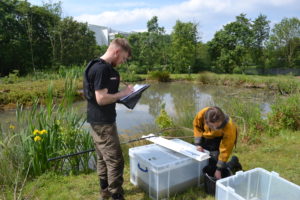Impacts on freshwater environments resulting from development need to be identified and assessed early in the planning process so that they can be managed.
We deliver scientifically robust and regulatory compliant assessments including freshwater Ecological Impact Assessments (EcIA) and Water Framework Directive (WFD) assessments, both as stand-alone studies, and contributing to Environmental Impact Assessments (EIA).
What we do
We advise clients on the scope of aquatic ecological assessments. We recognise that baseline survey programmes are costly and need to be scoped to reflect the scale of the development. We work closely with our in-house EIA team to ensure assessments are appropriately scoped in order to minimise risks to our clients’ planning applications.
Our scientists have a depth of technical expertise and practical experience that covers the impacts of developments on freshwater receptors including channel and flow modifications, effluent discharges, abstraction, and noise and vibration from piling and other construction activities.
Our approach to EcIA follows sectoral guidance published by the Chartered Institute of Ecology and Environmental Management (CIEEM).
WFD assessment considers the impacts of development on the status of waterbodies covered by the Directive, including rivers, lakes, standing waters and wetlands (known as Groundwater Dependent Terrestrial Ecosystems (GDTE)). The assessment focuses on the impact of the development on a range of biological, chemical and physico-chemical receptors (known as quality elements) as well as hydromorphology.
Thomson’s freshwater team have considerable experience of undertaking WFD assessments ranging from small residential development schemes to major infrastructure projects such as the Thames Tideway Tunnel.
To discuss your requirements or to find out more about the freshwater impact assessments that we offer, please contact us today.

















